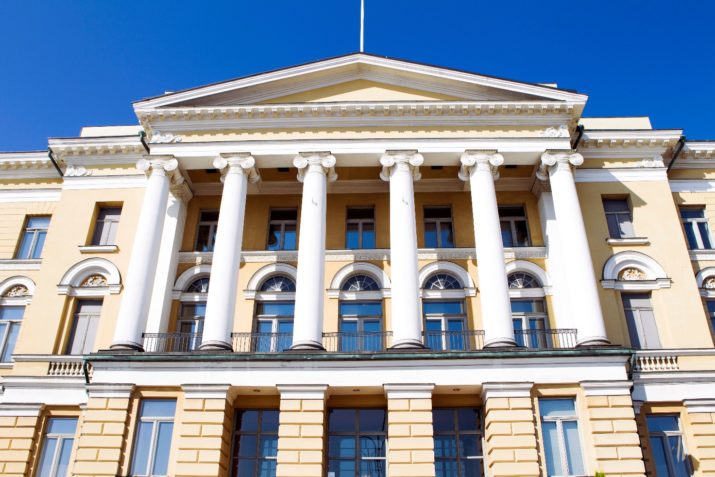
The Helsinki Centre for Digital Humanities (HELDIG): Developing the Digital World Together

This is part of our special feature, Digitization of Memory and Politics in Eastern Europe.
A spotlight on the University of Helsinki.
The digital world with its digitized resources, such as the Web with its data, services, and applications, is changing the society in fundamental ways and creating opportunities and challenges for globalization. Digitalization provides ever more new research opportunities in the humanities and social sciences, and rapidly changes ways in which research is done. These developments create a growing need for novel research and education in the emerging multidisciplinary field of Digital Humanities (DH).
What is HELDIG?
The Helsinki Centre for Digital Humanities (HELDIG)[1] aims to build a research network and infrastructure for solving research problems in the humanities and social sciences with novel computational methods, and for studying digitalization as a phenomenon. The goal is to form an ecosystem that fosters collaboration between academic research groups, memory organizations, companies, and the general public. HELDIG was established in 2016 at the University of Helsinki (UH)[2] as a joint effort by six faculties, i.e., the faculties of Arts (coordinator), Educational Sciences, Law, Science, Social Science, and Theology. The starting phase 2016–2020 of the center, with a budget of about 10M€, is supported by the Academy of Finland as part of special national profiling actions that aim at redirecting research and education in Finland on a national level. At HELDIG, eight new tenure track professor positions in DH related fields have been established in the participating six faculties within UH. HELDIG also advances several other strengths and initiatives at UH and beyond in the areas of natural language processing, computer aided linguistics, research on social and psychological aspects of digitalization, quantitative social sciences, digitized cultural heritage, and artificial intelligence. HELDIG solicits collaborations with other major related centers in Helsinki capital area, such as the Helsinki Centre for Data Science (HiDATA)[3], Finnish Center for Artificial Intelligence (FCAI)[4], and Helsinki Institute for Information Technologies (HIIT)[5].
Strategy
The HELDIG strategy is based on four tiers: research, education, infrastructure, and society.
Research: The challenges of digitalization are tackled by re-focusing, joining, and coordinating the intellectual and other resources in humanities, social sciences, and computer science across faculties, universities, and other stakeholders in the Helsinki capital area, in Finland, and internationally.
Education: HELDIG provides DH education not only for students, but also for researchers and application developers in Digital Humanities. For this purpose, e.g., new curricula and learning online materials are being developed.
Infrastructure: A key ingredient of HELDIG is to provide its ecosystem with support for digitizing, enriching, and publishing data and knowledge that is needed in DH research and is produced by it. HELDIG is co-operating partner of the DARIAH-EU[6], the European Research Infrastructure Consortium (ERIC) for the Arts and Humanities. The Finnish CLARIN-EU (European Research Infrastructure for Language Resources and Technology) node FIN-CLARIN is situated in HELDIG.
Society: Digitalization and globalization are changing the world. Fostering the utilization of the research results of Digital Humanities in the society is therefore of great importance and on the agenda of HELDIG.
Activities
The eight new professors, along with their teams, promote digital scholarship in the participating faculties. To foster cross-disciplinary collaborations between the research groups in faculties and beyond, there is a HELDIG core for support and community building. The active HELDIG network[7] includes not only universities, but also museums, archives, libraries, and media organizations in Finland and beyond. Communications and activities in the network include regular meetings, such as the HELDIG Summit that has gathered more than 200 participants annually, and various other workshops and conferences, such as the Digital Humanities in Nordic Countries 2018. The open HELDIG Facebook group has nearly 700 enthusiasts in DH, and there is a mailing list, too. A “match making service” as well as a “data clinic” has been established for support. In HELDIG DH Forum, scientific presentations about DH related activities are heard, there is the Aalto HELDIG Pizza series of lunch time speeches and meetings, as well as a DH Reading Group and a DH Research Seminar. A particularly successful HELDIG activity has been the annual Helsinki Digital Humanities Hackathon, where humanists, social scientist, and computer scientist team up in solving DH problems using real world datasets.
Eero Hyvönen[8] is director of HELDIG at the University of Helsinki and professor of semantic media technology at the Aalto University. A major recent theme (since 2001) in his research has been the development of the national level semantic web infrastructure in Finland and its application in different areas, especially in Digital Humanities. Eero Hyvönen has published over 400 research articles and books and received several national and international awards. He acts in the editorial boards of Semantic Web – Interoperability, Usability, Applicability, Semantic Computing, International Journal of Metadata, Semantics, and Ontologies, and International Journal on Semantic Web and Information Systems, and has co-chaired and acted in the program committees of tens of major international conferences.

[1] HELDIG homepage can be found at http://heldig.fi
[2] Established in 1640, the University of Helsinki is the oldest and largest university in Finland, ranked regularly among the top 100 universities in the world.
[3] https://www.helsinki.fi/en/helsinki-centre-for-data-science
[6] For more information about DARIAH-EU, see https://dariah.eu/.
[7] http://heldig.fi/network-of-collaboration
[8] https://seco.cs.aalto.fi/u/eahyvone/
Published on September 10, 2019.




